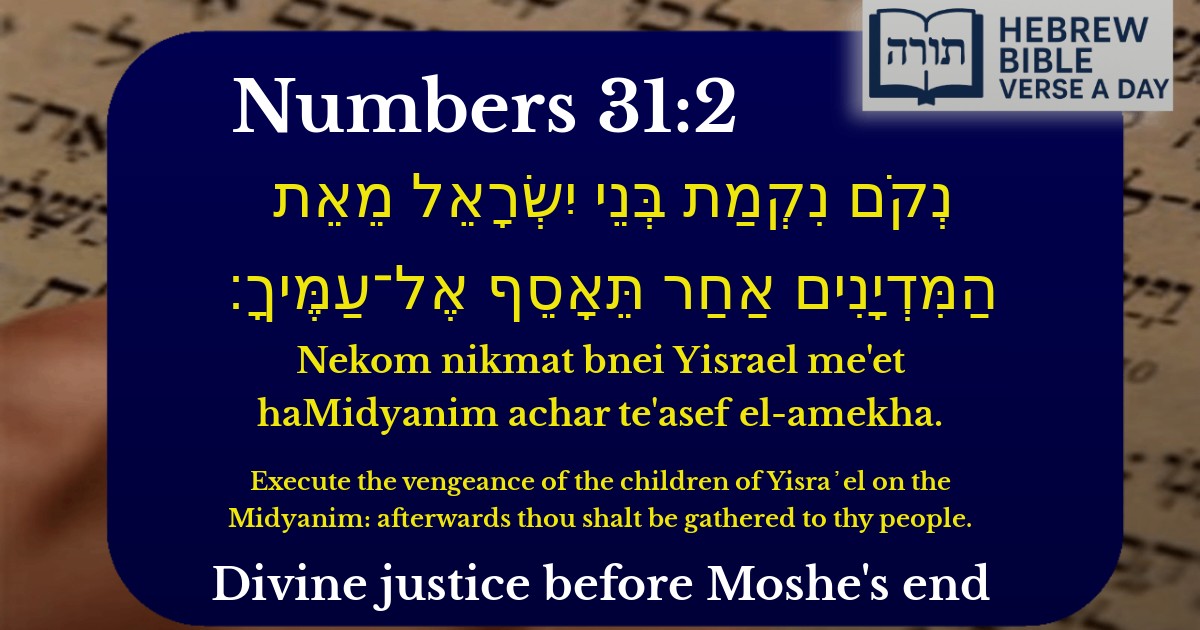Frequently Asked Questions
Q: What does 'Execute the vengeance of the children of Yisra᾽el on the Midyanim' mean in Numbers 31:2?
A: This verse commands the Jewish people to wage war against Midyan as retribution for their role in leading Bnei Yisrael astray through immoral behavior and idolatry (as described in Numbers 25). Rashi explains that this was a divine commandment to hold Midyan accountable for their harmful actions against the Jewish nation.
Q: Why was the vengeance specifically against Midyan and not Moav in this verse?
A: Although both Midyan and Moav were involved in causing Israel to sin (through the incident with Bilaam and the daughters of Moav/Midyan), Midyan was singled out because they initiated the plot with greater malice. The Talmud (Sanhedrin 106a) explains that while Moav acted out of fear, Midyan acted out of pure hatred, making them more culpable.
Q: What is the significance of the phrase 'afterwards thou shalt be gathered to thy people' in this verse?
A: This phrase hints that this would be Moshe's final mission before his passing. Rashi explains that Hashem was telling Moshe that after completing this commandment of battling Midyan, his time to leave this world would come. This teaches that one's mission in life must be completed before departing.
Q: How does this commandment to fight Midyan apply to us today?
A: While we don't wage physical war today, the Rambam (Hilchot De'ot 1) teaches that we learn the importance of standing against those who seek to spiritually harm the Jewish people. Just as Midyan tried to lead Israel astray, we must be vigilant against negative influences that threaten our spiritual wellbeing.
Q: Why does the Torah use the term 'vengeance' when speaking about the battle with Midyan?
A: The term 'vengeance' here doesn't mean personal revenge, but rather carrying out divine justice. The Midrash (Bamidbar Rabbah 22:4) explains that this was a measured response to Midyan's attempt to destroy Israel spiritually. The Torah uses strong language to emphasize the severity of their actions and the need to uphold moral boundaries.


Context of the Verse
The verse (Bamidbar 31:2) commands Moshe to wage war against Midyan as retribution for their role in leading Bnei Yisrael astray through the incident of Ba'al Pe'or (Bamidbar 25). This is one of Moshe's final missions before his passing, as the verse states, "afterwards thou shalt be gathered to thy people."
Rashi's Explanation
Rashi (31:2) explains that this vengeance was specifically for the harm Midyan caused Bnei Yisrael, despite not being attacked by them first. He notes that while Moav also participated in the sin of Ba'al Pe'or, the Torah focuses on Midyan because they initiated the plot (based on Sanhedrin 106a). Rashi further comments that the phrase "afterwards thou shalt be gathered" implies this was Moshe's final mission before his death.
Rambam's Perspective
Rambam (Hilchot Melachim 5:1) discusses this war as an example of a milchemet mitzvah (obligatory war), required to punish those who seek to spiritually harm Klal Yisrael. He emphasizes that such wars are not for territorial expansion but for defending the spiritual integrity of the nation.
Talmudic Insights
Midrashic Interpretation
Bamidbar Rabbah (22:4) states that this command came specifically before Moshe's death to complete his mission of defending Yisrael's honor. The Midrash compares this to a faithful shepherd who protects his flock until his last moment.
Later Commentators
The Kli Yakar (31:2) notes the double language of "נְקֹם נִקְמַת" (literally "avenge the vengeance") to teach that this was both vengeance for the past sin at Ba'al Pe'or and a preventive measure against future harm from Midyan.